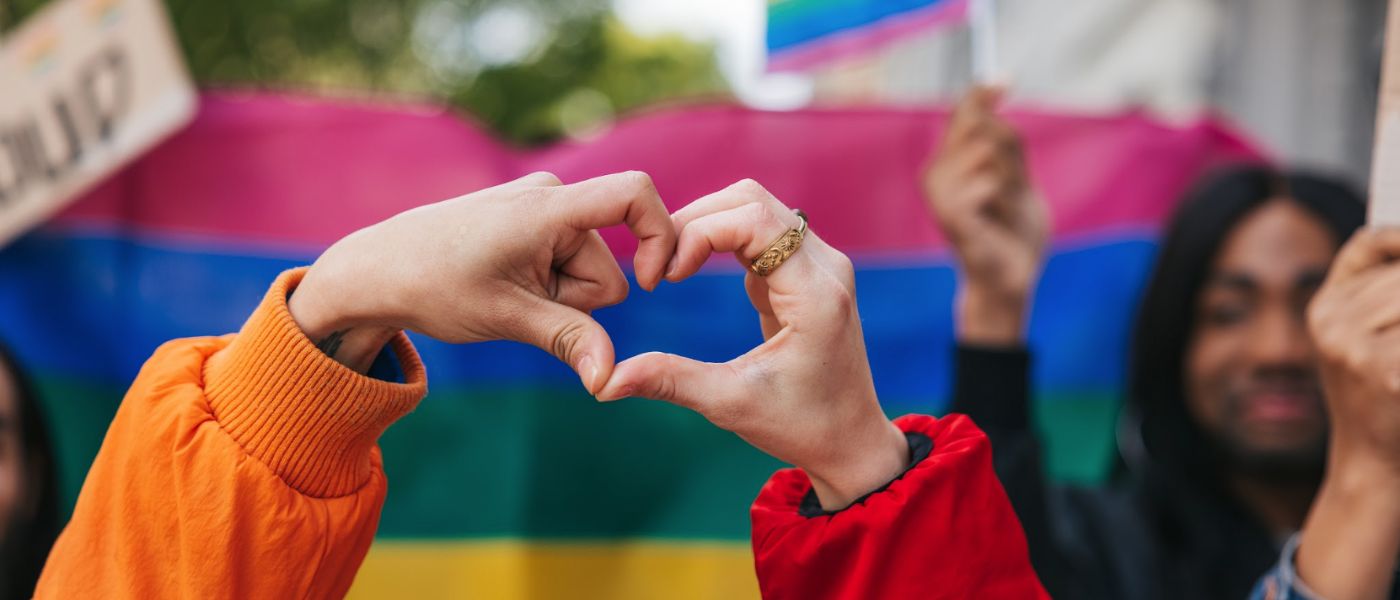Today (Oct. 11) is National Coming Out Day—a day for the LGBTQ+ community to celebrate their identities and the journey to feel seen, known and respected.
To mark the occasion, The Daily spoke with five openly queer members of the Case Western Reserve University community about their experience coming out, and advice they have for others who may be looking to do the same.
Regardless of where you are in your coming out journey, the university’s LGBT Center can provide a safe environment for private conversations with staff, support groups and connections to helpful resources along the way.

Devin Fabian (he/him)
Associate director, Office of Residence Life
What is your coming out story?
Well, I came out to my friends at 12. It was one of those conversations where you feel like if you just act casual and lead with some humor and a witty comment, things will go just fine and people will barely notice what you said. The friends I had growing up were basically family and we knew (almost) everything about each other. One night, we were getting ready to play some games outside and I figured I should just do the thing. So I did. It was a true “hey, so by the way, you know I’m gay, right?” situation and I played it off just about as well as I could. What I didn’t expect was that no one seemed fazed by it at all. It was simultaneously anticlimactic and lifted a weight off of me. The same thing happened when I came out to the rest of the school shortly after that. I was shocked that my small suburban middle school community didn’t bully me left, right and center … and they were supportive about it. I couldn’t really have had a better experience and hope I can help that outcome happen for others, too.
What has been the best part about coming out?
Feeling the proverbial sunlight on my face once I got out of the closet. Getting some fresh air. Being truly free (enough) to move through the world in the ways that I always wanted to. It wasn’t perfect and there were challenges, but I felt like I was empowered to be the main character that my story needed and deserved.
What was challenging about coming out?
The idea that it could change everything. I appreciate the unknown and that possibilities can be unforeseen and maybe even endless. But when you’re thinking about your life changing suddenly, it’s going to affect you in lots of little ways and some big ways, too. I remember being confident because I didn’t have any other option. I had to be my authentic self even if there were consequences or if I lost people close to me. It’s really hard to prepare for something like that but in the end, I had to be fair to myself.
What advice would you give someone who wants to come out but hasn’t yet?
Consider your relationships with other people. How do you normally engage and communicate with them? Who might you have the easiest conversation with? Do you prefer to get the “tougher (big) thing” out of the way or handle easier tasks first? Thinking about the ways that you move through the world of your social circle. If you have a plan and think about it in advance, you’re probably going to feel more comfortable. And remember, it’s a process and a journey. It’s not night and day or black and white. You’re always going to feel uncertain in some (small) way or a tinge of that uneasy feeling in your stomach. But if you have a plan and practice, it makes things so much easier.
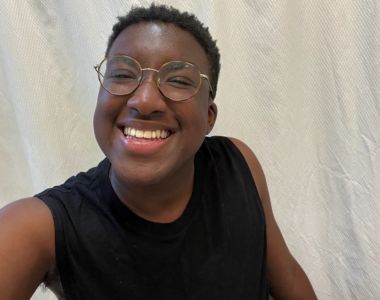
Malcolm Miller (he/him)
Second-year sociology and psychology major
What is your coming out story?
When I was in sixth grade, Miley Cyrus posted on Instagram that she was pansexual. Clearly unaware of the term’s definition, I shared the post with my friends and told them that I, too, am pansexual, so they should feel free to use any pronouns for me. When they didn’t use he/him pronouns as much as I secretly wanted, I decided to come out as transmasculine and bisexual. Those general labels have stuck to this day! I started feeling very comfortable with my new name and pronouns when teachers began using them. Supportive teachers rock!
In 2021, I began to realize that despite wanting and getting many things that trans men do (legal name change, hormone replacement therapy, gender reassignment surgeries), I was in fact nonbinary. I knew that my friends and family would be supportive, but I suspected that they might be confused also. Additionally, I was worried about medical professionals who gatekeep gender-affirming care from people other than binary trans people. After having my gender identity affirmed by a provider, I decided it would be okay to come out to friends and peers when it felt relevant. Supportive providers rock!
What has been the best part about coming out?
Getting to help people figure out how to talk to family, teachers, peers and friends is a really fulfilling experience. Helping friends reminds me of how far I’ve come and how much knowledge and experience I’ve gained by being out.
What was challenging about coming out?
Initially the most challenging part was navigating how to maintain my safety at home while being myself at school. Once I moved to a safer environment, the challenge was gaining the courage to be true to myself even if my gender expression didn’t align with mainstream perceptions of my newly-announced gender identity. I still get worried sometimes that using he/him pronouns or wearing skirts will undermine my identity as a non-binary person to others.
What advice would you give someone who wants to come out but hasn’t yet?
Firstly, prioritize your immediate safety. Unfortunately, considering whether coming out will compromise your physical, emotional or financial safety is an important reality for many queer and trans people. Secondly, go slow. Tell people that you know are trustworthy and supportive first so they can help you tell the other people in your life. Lastly, for closeted trans adults, author Daniel Lavery has far better thoughts than I do.
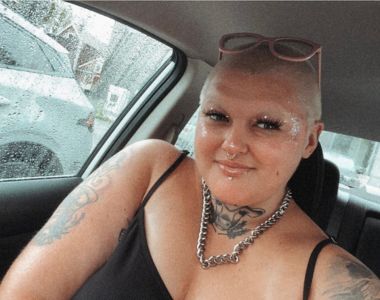
Sam Motes (they/she)
Education program manager, Flora Stone Mather Center for Women
What is your coming out story?
The beauty of my story, like that of many others, is it is constantly in flux and ever changing. I am coming out every day of my existence living within a society that is not socialized to the existence of my community. My beautifully diverse community of all bodies, lives and loves. My existence is my coming out story. Until I cease to exist, as I do not see society creating radical change before that happens, I think I will continually be coming out. When I am amongst fellow community members, that is when I feel most at peace, most seen, most heard and most understood.
What has been the best part about coming out?
Truly being connected to myself as I continue to learn more about myself. You live your whole life being socialized and told that you are a certain way/person/gender, and then you become independent and autonomous. This autonomy has led to so much self growth where I get to choose who I am, what I believe, the kind of person I want to be. Coming out is truly a sense of coming into one’s self, and that is the best feeling in the world.
What was challenging about coming out?
The fear of not being believed, understood, accepted and legitimized. I think that says a lot about society itself, however, more uniquely for my community, when you exist in a world that’s not affirming or accepting of your existence, the desire to have those needs met are critically important for some. Aside from the need to feel worthy of existence, other challenges include adjusting your worldview and perspective on how the world is going to interact with you.
What advice would you give someone who wants to come out but hasn’t yet?
Lean into the discomfort, find community and find yourself along the way.
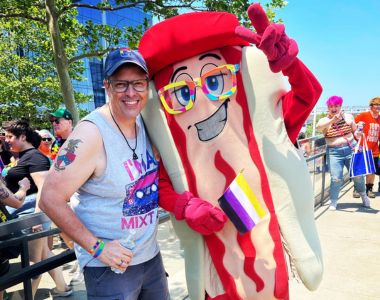
Jason Steckel (he/him/they)
Associate director, Office of Greek Life
What is your coming out story?
I only came out in the last few years in my early 50s. While I had been wrestling with my sexuality for years, I visited my first LGBTQ bar while on a trip out of town in the fall of 2021. Being in that space opened up something in my heart and that November I got a tattoo—my first—that included the pride flag colors. I wasn’t quite ready to come out yet though; I would tell people the tattoo was in support of the community. My official “coming out party” was the following summer at Sandusky Pride 2022.
What has been the best part about coming out?
For years, I struggled with my sexuality, especially where it seemed to conflict with my religious beliefs. Ongoing therapy, intense study and mindfulness practice were significant parts of my internal “coming out” to myself before I came out to the world. The best part of coming out has been the resolution of years and years of that cognitive dissonance. After facing an intense internal struggle between what I felt and how I viewed myself and presented myself to the world, I have discovered so much peace and healing over these last couple of years.
What was challenging about coming out?
One of the most challenging things about coming out has been the response from many of my friends, especially in the religious communities I have been part of over the years. For nearly two decades, I belonged to a religious community that considers my bisexuality sinful and something that could jeopardize my salvation. Some of my friends in that community have rejected me and others have tried to correct my “error.” Even though I know they mean well, that has been a painful experience. In addition to the feelings of rejection, their words sometimes stoked the flames of shame I had experienced for years.
What advice would you give someone who wants to come out but hasn’t yet?
Everyone’s journey is different, so what helped me may not help someone else. Having said that, it can be helpful to find people you can trust to come out to one at a time. Whether one person or a small group, finding those who will accept you helps build confidence and can be a source of healing. I am also a huge advocate for counseling. Finding a supportive and affirming therapist can be incredibly helpful. At the end of the day, coming out is all about being seen and finding acceptance. For me, finding acceptance was an internal and external journey. Learning to love and accept myself allowed me to be ready to seek that same love and acceptance from others. It has not always been easy, but it has certainly been good.
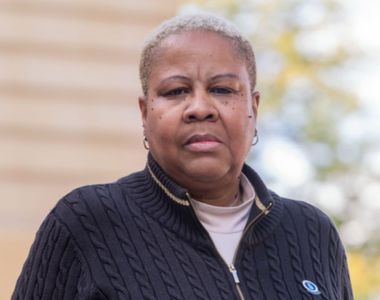
Kimberly Adams (she/her)
Equity specialist and investigator, Office of Equity
What is your coming out story?
Where do I begin? I came out as a same-gender-loving woman as a 23-year-old attending college at an HBCU (Historically Black Colleges and Universities) in the deep south. It was a challenging time for me for sure. At that time, the only way you talked about Black folx “coming out” was to talk about “that auntie” or “that uncle” in whispering tones, or know that you would not be acknowledged at all within family functions or your community.
I guess one could say that I was “lucky” because I chose to stay far away from the fray and grow into myself my way. At the beginning, you may lose people along the way, but for me it’s better to “own” your own story than to have someone else own you and your peace of mind. I just hope that in sharing my story that I can not just inspire others in my community to live their truth their way, but to be inspired by others’ lived experiences as well.
What has been the best part about coming out?
The love my granny showed me when I told her about coming out as a same-gender-loving woman. I remember her telling me that she knew for a while; that she loved me for who I am and that she knew I would inspire others. She also promised that she would never let anyone hurt me and she did that until she left this earth for her heavenly home.
What was challenging about coming out?
I came out at a time and in a place where it wasn’t accepted, especially in the Black community and the military. So, whether it was the college I attended, the sorority I am a member of (Alpha Kappa Alpha Sorority Inc.), my family, church or the military, the barriers were real—but I had to stay true to who I am and continue to fight for acceptance. It got lonely, there were good times in the midst of challenging ones, but through perseverance and blessings, I’ve lived to see walls of bigotry and hate come down. We’ve still got a long way to go but there is light at the end of the tunnel.
What advice would you give someone who wants to come out but hasn’t yet?
You will know when it’s time. Don’t let anyone own your story because it’s a work in progress every day.

